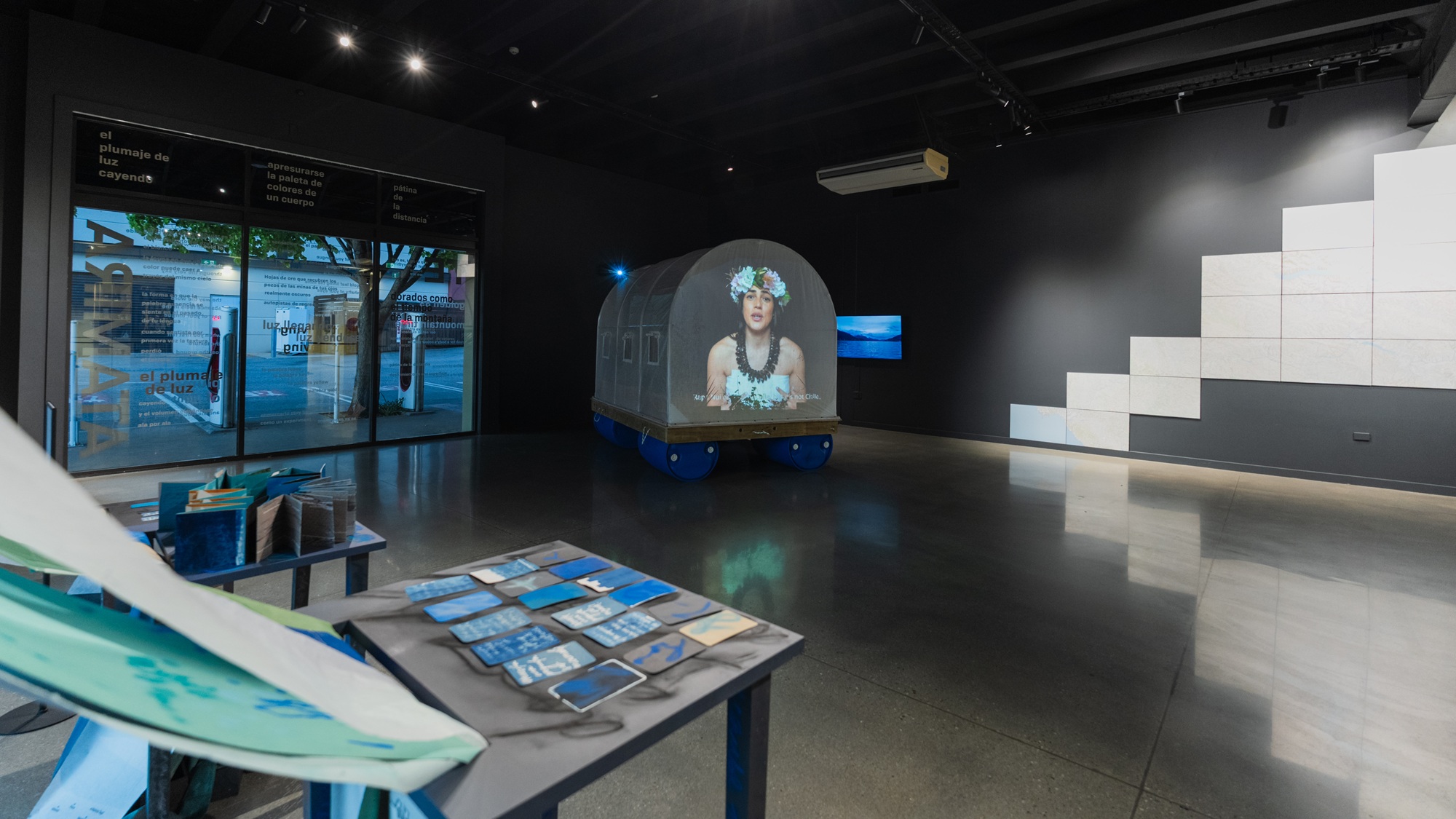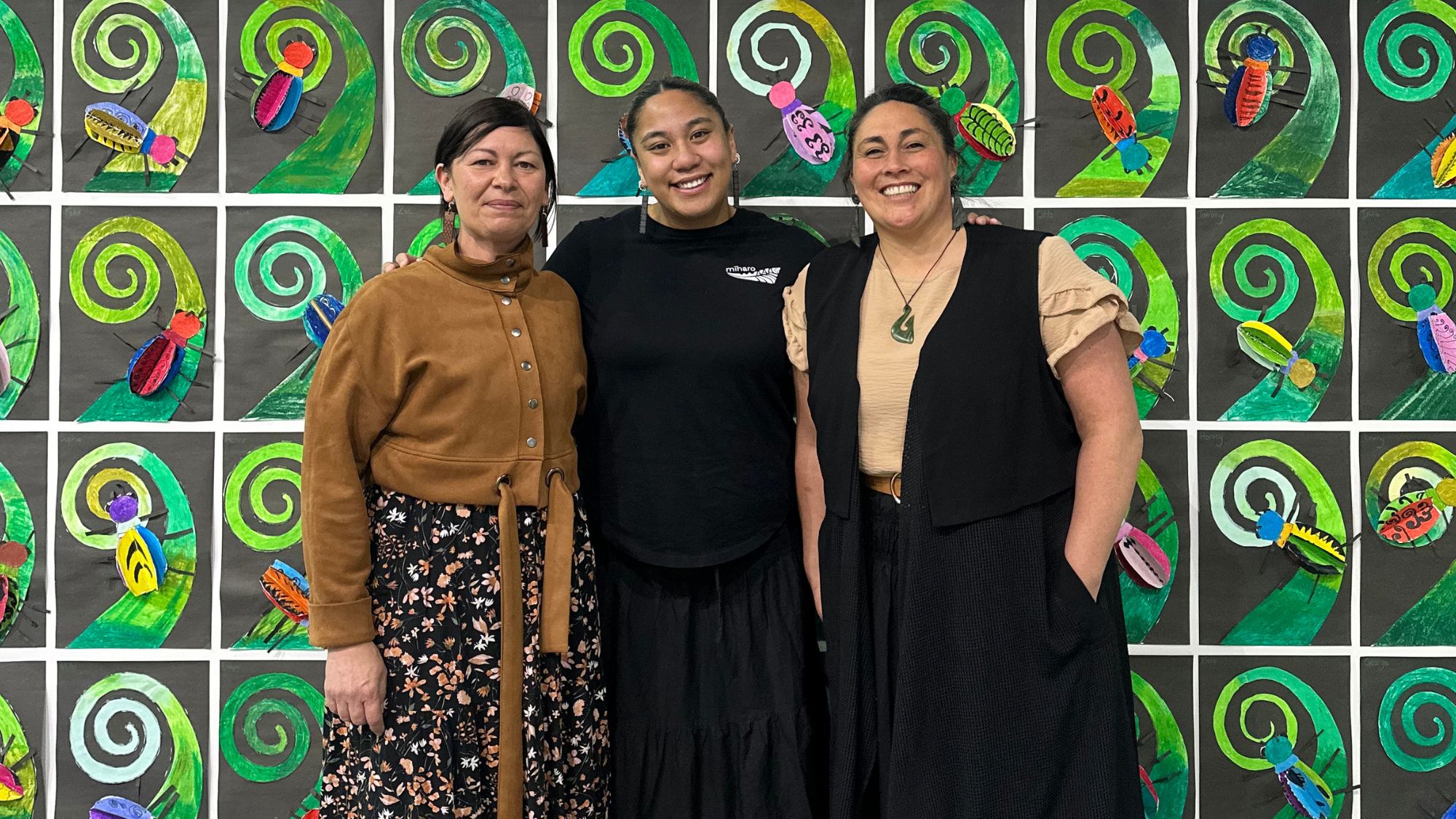Happy accidents: Jasmine Clark

A few words with Jasmine Clark during her Open Studio at Te Atamira - June 2022.
Last Thursday, Te Atamira opened the first of two Open Studios we are hosting in June and July. The first is with Arrowtown-based contemporary weaver Jasmine Clark who is currently working on large-scale pieces for a new commission for a Hyatt Hotel slated for a site near Te Atamira in Remarkables Park in Frankton. Her temporary work space at Te Atamira (23 June – 10 July 2022) is accompanied by a display of some of the materials she uses in her work, including rattan and copper wire and materials foraged from the environment such as willow, dogwood, harakeke (flax) and neinei – an endemic tree used in customary Māori weaving techniques, particularly for practical use on rain capes.
During her time at Te Atamira, she offered three sold-out workshops in wire, rattan and flax weaving. The contextual display also includes samples of pieces produced in the workshops and a number of smaller pieces that demonstrate Jasmine’s inventive use of natural and manmade materials resulting in delicate pieces that appear to float on the wall and cast intricate shadows when the morning sun floods over Kawarau (The Remarkables) and into MANAAKI NUI – our project space at Te Atamira.


During today’s Tea Break talk (10:30am on Tuesdays and Thursdays at Te Atamira) I asked Jasmine about the challenges of working at a larger scale than some of her previous works. Firstly, she explained that quite a long time is spent working out what kinds of materials are suitable for scaling up the work and how she then needs to adapt the techniques she uses in order to produce the forms and effects she’s working towards. The works-in-progress you can see Jasmine working on at Te Atamira are her third and fourth attempts at producing the right kind of frame and structure using thicker wire and rattan as a basis. She says that the thicker wire doesn’t have the wispy gracefulness of the thinner wire used for smaller works. Thicker rattan is not as pliable and is hard to bend – it can only curve so much. These conditions mean that a lot of play and experimentation is needed to get the technique down, which for the artist is quite a private process – a bit of a challenge in the public situation of the Open Studio. On the other hand, Jasmine is finding that working in a social space where you can stop for a chat and cuppa with friends dropping by is not as isolating as working at home alone can be.
Jasmine’s cultural heritage is Italian, Scottish, English, Irish and Norwegian. She grew up in a very rural setting in Karekare on Auckland’s west coast and cites her key influence and inspiration as the natural environment, which provides her with a plethora of materials and structural forms to incorporate in her contemporary weaving and basketry practice. Her mother and grandmother were both rug weavers and, while she was doing a sculpture/object design degree at Unitec in Auckland, she took a night class in raranga, a customary Māori weaving style used for rourou (food baskets), kete (bags) and other small objects. Her raranga teacher – Joy Wikitera (now teaching up in Kataia) – became a friend as well as a big influence on the development of her weaving practice. Through this relationship, she was invited to a weaving hui in Kaikoura, which opened her eyes to the variety of customary weaving techniques. Around the same time, she came across a British Crafts Council exhibition catalogue called Contemporary International Basketmaking (1999), which illuminated a wide range of contemporary basketry practices beyond traditional techniques and applications. Through the lens of the craft revivalist experiment of the time - an emerging interest in contemporary craft practices that continues to flourish - the insight offered by the 1999 catalogue helped to inspire Jasmine's experimental approach to woven objects, pushing the bounds of conventional forms and definitions.
She moved to Arrowtown around 15 years ago and brought up a small family. Until this year, she had also been managing the Saturday art market on the Queenstown lake front for the past 11 years. Selling her work at the market led to a chance encounter with an Australian basket-maker who invited her to the biannual Australasian National Basketry Gathering on the Gold Coast in 2017 - a project designed to promote basketry and related fibre arts throughout the region. Jasmine was one of the youngest attendees of around 150 people, some from different parts of the world and many of whom were experimenting with innovative styles and techniques. She was invited to run a workshop and subsequently attended the Adelaide edition of the Gathering. Meeting like-minded practitioners allowed her to experience the multiplex possibilities of her craft and to continue to develop her own unique styles and techniques based on experimentation and play – always steeped in the possibilities of the materials and structures offered by the surrounding natural world.
Happy accidents through play and experimentation, as well as endurance, combine to produce Jasmine’s distinctive practice.
Jasmine will be working at Te Atamira most days between 11am – 3pm, Monday to Friday. Click here for further information.

Our next Open Studio will be with kaiwhakairo/master carver Steve Solomon from 14 – 31 July. Click here for more information.
Louise Garrett, Arts and culture coordinator




